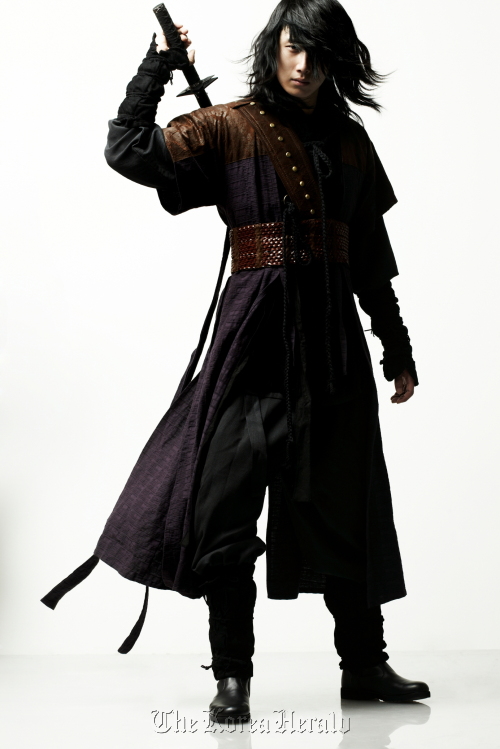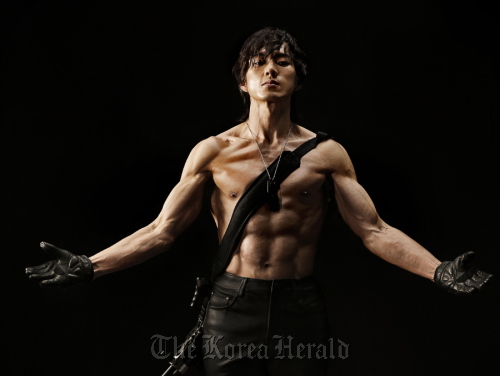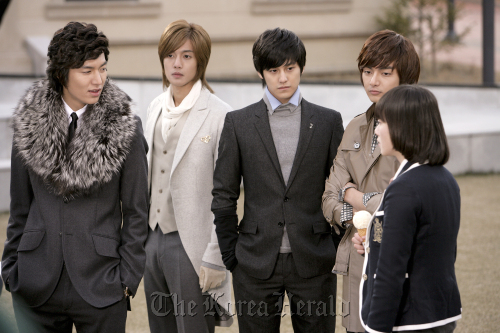TV dramas take second crack at unsuccessful comic book hero genre
In Hollywood, comic book heroes are a surefire draw.
“Superman” helped jumpstart a cinematic pantheon of costumed crusaders. “Batman” swooped onto the scene in 1989, “X-Men” in 2000 and “Spider-Man” in 2002.
Fascination with the genre spawned the NBC TV series “Heroes” in 2006. A macabre exploration of the dilemmas that torture humans gifted with supernatural powers, the show was an instant hit and ran for four seasons.
In Korea, however, superheroes have been receiving a lukewarm response. Recent rehashes of dark knights from beloved comics faltered on the small screen, beginning with MBC’s “Moon River” in 2009.
Viewer ratings declined as the remake of Ko Woo-young’s classic 1970s series unfolded. The final episode scraped by at 8.8 percent (AGB Nielsen Media Research).
 |
“Moon River” (MBC) |
Ironically, SBS’ “Il Ji-Mae: The Phantom Thief” ― which was based on the same hero but not on the comic book ― reeled in high ratings when it aired half a year earlier, giving rise to the possibility that audiences found “Moon River” stale when it rolled out six months too late despite its adherence to the original.
MBC’s “The Man Almighty” also missed the mark when it hit television in 2010. The clout of artist Park Bong-sung’s legendary five-part series depicting the vengeful escapades of hero Michael King failed to attract stellar ratings.
 |
“The Man Almighty” (MBC) |
Rather than write-off the genre, the drama industry has decided to give it a second chance.
SBS will air a remake of Tsukasa Hojo’s “City Hunter” in late May and Orange Entertainment and Sum Entertainment are producing a dramatized version of Shin Hyung-bin’s “Dosijungbul.”
“Boys Over Flowers” star Lee Min-ho will be tackling his second comic series-turned-drama as the hero of “City Hunter,” a role an agency representative confirmed the 23-year old prepped for by training for six months with an action director.
 |
“Boys Over Flowers” (Group Eight) |
Instead of remaining faithful to the original, the drama version proposes to adapt the mid-1980s to early 1990s series to modern-day Seoul, transforming Ryo Saeba’s playboy detective into a Blue House national communications network control team member as penned by “Dae Mul” scriptwriter Hwang Eun-kyung.
“In essence, one can assume that the TV series will be produced with a premise that suits domestic (audiences), meaning a lot of the content will be different from that of the original,” a PR representative for the drama said via e-mail. As a result, the drama will not necessarily be geared toward male audiences the way that the comic series was.
The team behind the upcoming dramatized version of the bestseller ― “Dosijungbul” ― also proposes to tweak the testosterone-loaded comic.
“We are currently adapting it,” Kim Jung-hwan, team head of the drama’s co-production company Orange Entertainment, said. “We are thinking of adding more melodrama while maintaining the original’s integrity.”
Kim ― who stated plans were to air the series in December ― hinted at more romance to come, without action taking center stage, a move that may attract more female audience members, which is crucial considering that women seem to form a majority of the TV drama viewership.
“I think the niche for broad and sweeping narratives is still narrow,” Chang Hyun-jin, project manager of production company Group Eight, explained why male-driven comic books may not find resounding success when translated to television. “While the number of male viewers tuning into dramas is increasing, in the past, viewers were primarily women.”
Wary to restrict the realm of successful dramatized comics to the rom-com genre, Chang expressed the belief in the need to explore more diverse genres. She admitted, however, that she felt the fluffy rom-com “definitely has its strengths” and “still holds sway over television channels.”
Group Eight helped pioneer the comic book-turned-drama trend, starting with MBC’s sleeper hit “Princess Hours” in 2006 when the company ran under the name Eight Peaks.
Group Eight made waves with its highly popular “Boys Over Flowers” before bringing in less successful results with two other love-tinged dramatized comics ― “Tamra, the Island” and “Naughty Kiss.”
In its near seven years of culling from the creative annals of drawn prose, Group Eight has yet to latch onto the male superhero genre.
The staying power of romantic comics ― called “sunjeong manhwa” in Korean ― was also reinforced when SM Entertainment announced plans to produce the Korean version of the popular Japanese series “Hanazakari no Kimitachi e” in March.
The gender-bender rom-com features a girl who dresses up as a boy and enrolls in an all-male school so she can rub shoulders with an athlete she has admired from afar.
According to a PR representative of the music goliath, the 16-episode series is slated to air this year.
Though Group Eight is shopping around a golf comic remake titled “Birdie Buddy” and SBS has garnered great success with dramatized versions of iconic political and food-oriented comics like “Dae Mul” and “Sikgaek,”respectively, the comic book superhero has yet to become a staple of primetime television.
That does not mean that audiences are not open to the possibility. Chang believes that Korean viewers like to tune into shows that detail the making of the superhero, enabling them to relate to the trials and tribulations the lead faces early on as he creates his superhero identity and unravels the secrets of his origins.
“Be it in America or in Korea, everyone yearns for superhero stories,” said Chang.
By Jean Oh (
oh_jean@heraldcorp.com)









![[Today’s K-pop] Blackpink’s Jennie, Lisa invited to Coachella as solo acts](http://res.heraldm.com/phpwas/restmb_idxmake.php?idx=644&simg=/content/image/2024/11/21/20241121050099_0.jpg)
